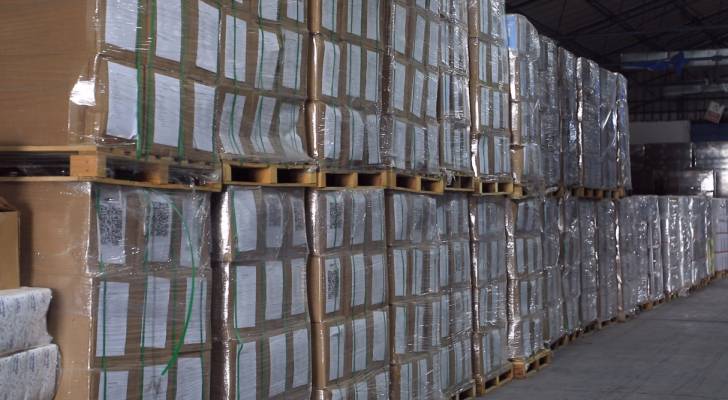UNRWA / Aid supplies stored in Amman on May, 28. 2025
Access restrictions trap UNRWA aid for over 200,000 Gazans in Amman
Humanitarian aid destined for the Gaza Strip remains trapped in a warehouse in Amman, enough to help 200,000 people for an entire month.
Some of this aid has been sitting idle since January, while Gaza’s population continues to suffer under an unrelenting siege and escalating genocide.
UNRWA spokesperson Jonathan Fowler spoke to Roya about the situation. “The aid in this warehouse has been sitting here for varying lengths of time—some since January, and some even longer, dating back to last year,” he explained. “It includes food supplies, hygiene kits, and other essentials—enough to support 200,000 people in Gaza for one month.”
Fowler added that despite the urgent need, the aid remains stuck due to restrictions imposed by 'Israeli' authorities in early March, which have not been "properly lifted". “The blockade has led to a near-total siege on humanitarian aid, with only minimal quantities allowed in—described as a ‘microdot,’ not even a drop in the ocean.”
“While some aid has recently begun to move, it remains vastly insufficient. For context, 500 to 600 trucks per day are needed to meet minimum survival needs in Gaza, yet these numbers have rarely been reached, except briefly during a temporary ceasefire that demonstrated aid could flow if allowed.”
Fowler emphasized that the failure to enable aid access consistently represents a deliberate decision that, in the view of UN officials, weaponizes humanitarian aid—violating principles of international humanitarian law. “UNRWA has repeatedly called for unrestricted, large-scale aid access, emphasizing the neutrality and humanity of their mission,” he said. “The agency, with 12,000 staff in Gaza, is ready to distribute the aid but needs permission to do so.”
He also warned of the risk of spoilage. “Spoilage is a major concern, particularly for food, which risks going to waste in warehouses while people in Gaza go hungry. This is not only a humanitarian failure but also a misuse of donor funds from taxpayers around the world.”
Fowler underscored the toll on UNRWA staff. “Since the war began, over 300 UNRWA staff have been killed—an unprecedented toll in UN history. Despite this, the agency continues providing essential services, including 19,000 daily medical consultations and educational support for 35,000 children. However, it is running out of food, medicine, and basic supplies. Without a massive increase in aid flow, the consequences will be catastrophic.”
“There’s enough aid here for 200,000 people alone for an entire month. We just need the political will,” said an UNRWA official overseeing aid operations. The blockade imposed by 'Israeli' authorities since early March has effectively sealed off all but a tiny trickle of humanitarian assistance, leaving millions in Gaza on the brink of starvation and collapse.
According to the latest UNRWA situation report #172, the crisis in Gaza has worsened dramatically since mid-March, when 'Israeli' forces intensified bombardments from air, land, and sea. Tens of thousands have been killed or injured, and vital civilian infrastructure—including hospitals, schools, and residential areas—has been decimated.
For over 11 weeks, from 2 March to 18 May, no humanitarian aid was permitted to enter Gaza. The impact has been devastating: essential supplies like food, fuel, medicine, and vaccines have nearly run out. On 18 May, the 'Israeli' authorities allowed a limited amount of aid into Gaza, which UN emergency coordinator Tom Fletcher described as “a drop in the ocean of what is urgently needed.”
According to the report the nutrition crisis in Gaza is intensifying. Dr. Akihiro Seita, UNRWA Director of Health, warned that malnutrition is rising rapidly. Data from April reveals alarming increases in acute malnutrition among children, with thousands already treated since January.
Fowler also stressed the point that despite ongoing bombardment and displacement, UNRWA medical and educational services remain vital lifelines. The agency conducts 19,000 medical consultations daily and supports 35,000 children with education programs, yet essential supplies are dwindling rapidly. Forty-one percent of medical supplies are out of stock, and over a quarter are expected to run out within two months.
An UNRWA official speaking to Roya pleaded for urgent action: “We have enough aid to save lives immediately—we just need the political will. Unrestricted aid must be allowed to flow freely and at scale, in line with the needs on the ground. This is a fundamental principle of humanity, impartiality, and neutrality.”
Supplies already sitting in storage, enough to help over 200,000 people in Gaza—could be deployed at once, but restrictions continue to block their delivery.




